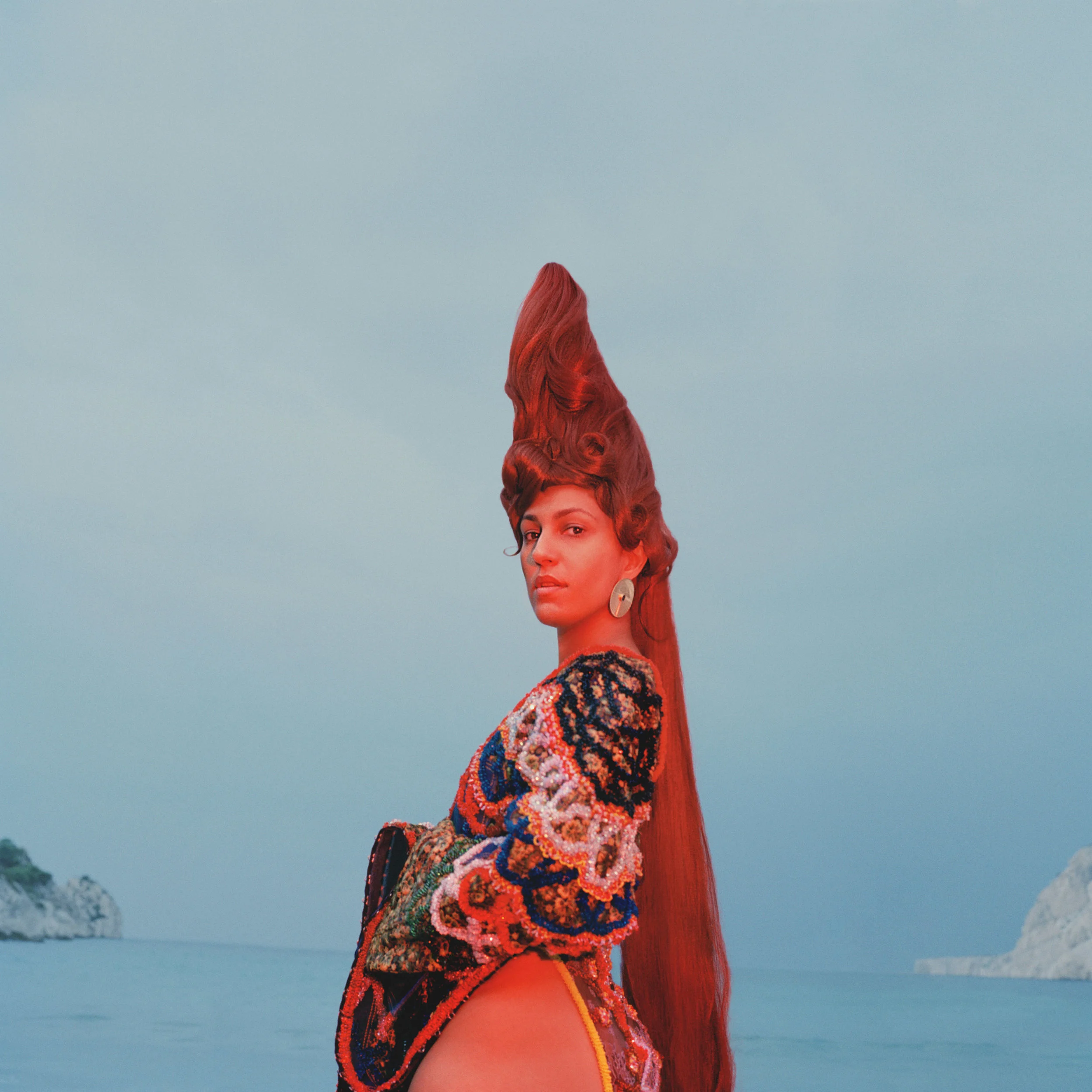Interview LAFAWNDAH
Photographer Mathilde Agius @mathildeagius
Makeup and hair Sara Mathiasson @sara_mathiasson
Styling Sharifa Morris @___sharifa
Words Ally Ferraro @ally_ferraro_
With more stamps in her passport then you ever seen, the Iran born, Sorbonne educated, art gallery manager in Mexico, currently living in London, Lafawndah reincarnates into a musician, artist, activist having a voice that clearly wants to better the world we live in.
Her ongoing creative relationship with filmmaker Partel Oliva has generated Leu Renard Blue, a visual and musical collaboration with Japanese ambient legend Midory Takada for Kenzo.
While listening to her beats and seeing her perform, we realize Lafawndah is playing nothing else but Lafawndah’s own style of music.
On march 22nd she released her debut full-length album, ANCESTORY BOY via her own label imprint CONCORDIA.
We caught up with the star to chat about the message behind her sounds and visuals, how it all began and what is her main fountain of inspiration.
AF: You said in one of your interviews that music fell into your arms, that it is not something you planned, somehow it came to you. Can you tell us a little more about how this happened?
L: Mmmm well let me correct that. I sure didn’t plan but I definitely ran into its arms when the time was right. I don ‘t know I was just not really satisfied with life really. And it just felt like the answer. It came later in life, after I already had a career as a writer and curator in visual arts. Now, most of the time, when I go to see shows in institutions or gallery, I am very happy I make music. It’s the most direct way to communicate with the largest trans class amount of people.
AF: You don’t seem to be the type of artist that is chasing the fame. Has your life changed since you are rising to the top? It must be amazing to work with very talented people, can you tell us some of your best creative moments?
L: No fame is not the motive, nor is individualism. I’m interested in power, because good things could be done with it, contrary to what we’ve been taught. And also it is useful in order to share the goods. But anyways, yeah so lucky to have worked with, well the some of the best musicians alive. I wouldn’t know how to choose. But just because I was in rehearsal with her today, I’d say meeting Midori Takada. I have never met a master. Someone who is mastering what it is that they do. It taught me a lot on how to make the distinction between perfection and intentionality. Perfection is not interesting, it’s not lively but the intention needs to be the motive because it gives precision and clarity. Also I laughed so much with her! She dances, she dabbs and is the best composer and percussionist. I learned that masters are also goofy. I made total sense.
AF: In the press release for Ancestor Boy it is mentioned that the album is a becoming-of-age story of a people yet to come, created out of a need to find others. Is this about your nomadic experience that you feel at home everywhere, but somehow you can’t settle and belong anywhere?
L: I also feel at home nowhere that’s why I keep moving. I think it is a record that is calling to rally all the people who don’t really fit in one dimensional narratives.
AF: “Daddy” seems to be a love story. You like to express political views through this gentle way. Do you have this kind of message with this track as well?
L: Daddy is about family. Filial love. Secrets. What you have access to as a kid. What you can take and run with, what you wanna leave cause it’s not yours and it doesn’t seem necessary.
AF: You worked on Ancestor Boy with fellow travelers Nick Weiss, Aaron David Ross, and L-Vis 1990. The result is an album overflowing of detail, of feelings, of ideas that serves to amplify a frequent lyrical motif: the sensation that one body, one lifetime, isn’t big enough for what we are feeling.
How long did it take you to complete the album? Did you write it in many different cities? What influence did this have on the sounds and lyrics?
L: Yes, I was so lucky to have people I had already produced with who were down to continue our adventure on a full length. It’s very interesting when there is a few different pair of hands in production cause we are all good at different things, different stages and there is this understanding between us that we can intervene where we are the best.
It took a lifetime to complete this album but i’d say 4 years all in all. I started producing and writing before my ep came out. I did write in many places just cause I didn’t really have a base during those years I was just wherever someone was paying for a flight and then staying with people. I guess it’s always been very important for me to have a sound that doesn’t sit comfortably anywhere and maybe yeah i just was also experiencing this physically and emotionally.
AF: Somehow the image on the cover makes me think of the apocalypse. Is that true?
L: I really don’t like dystopia. I prefer to talk about what we do want to happen than what we don’t want ever. But someone said about the record that it is the sound of the day after the apocalypse. When it’s time for a new order. And I like that a lot. It’s like behind us and now we are looking ahead while it’s still smoky and ashy behind, still.
AF: Are you planning for visuals for the tracks on this album?
L: Yesss. It’s coming. Bear with me!



